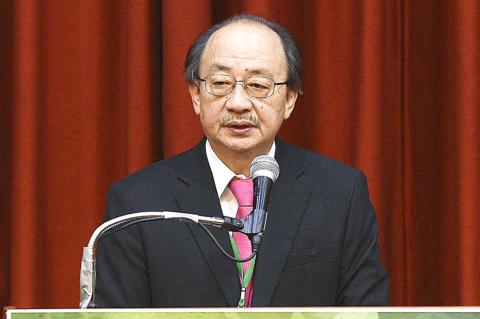The Democratic Progressive Party (DPP) caucus yesterday said it would redraft a proposed bill on monitoring cross-strait agreements in line with the Republic of China (ROC) Constitution, meaning the terms “Taiwan” and “China” would be changed to “Taiwan Area” and “Mainland Area.”
“We will submit an official caucus proposal for a bill to monitor cross-strait negotiations and agreements by the end of the month,” DPP caucus whip Ker Chien-ming (柯建銘) said after a meeting to prepare DPP lawmakers for the legislative session scheduled to begin today. “As for the name of the bill, we will refer to the ROC constitutional framework; we will not use the names we used in the past.”
Ker said that as the new bill is to conform with the ROC constitutional framework, not only would its title be changed, but some of its content would also be adjusted.

Photo: Chen Chih-chu, Taipei Times
The original bill drafted by the DPP in the previous legislature was called “Regulations for Handling Agreements between Taiwan and China,” with a preamble stating that the law was meant to regulate issues concerning the signing of agreements between Taiwan and China.
However, since the caucus has decided to follow the ROC constitutional framework, the terms “Taiwan” and “China” would be changed to “Taiwan Area” and “Mainland Area” in accordance with the Constitution and relevant laws on cross-strait issues.
New Power Party executive chairman Huang Kuo-chang (黃國昌) said Ker’s comments were unclear and that the DPP had an obligation to explain if and why its position had changed.
The “framework of the Constitution of the Republic of China” can be interpreted in different ways, depending on which part of the Constitution is referenced, Huang said.
He said that if the “framework” refers to the sovereignty invested by the Constitution in Taiwanese, it would not necessarily represent a denial of the “two states” dictum (兩國論), which was premised on the legal theory that the nation has already achieved de facto independence as a result of constitutional amendments passed during the democratization process.
Any framework that relegates Taiwan to the status of an “area” of the Republic of China and includes a Chinese “mainland” would be “unacceptable,” he said.
“We have invested a lot of energy into constructing a Taiwanese national consciousness and most Taiwanese have already accepted the fact that China and Taiwan are different countries — do you really want to go back 20 years and say that we are really ‘one country with two areas’?” Huang said.
The “one country with two areas” stance goes against common sense, while the 11th amendment which enshrined it into the Constitution was illegitimate because it had been passed by “lifelong” lawmakers who held their seats from 1949 until 1992, he said.

The Taiwanese passport ranked 33rd in a global listing of passports by convenience this month, rising three places from last month’s ranking, but matching its position in January last year. The Henley Passport Index, an international ranking of passports by the number of designations its holder can travel to without a visa, showed that the Taiwan passport enables holders to travel to 139 countries and territories without a visa. Singapore’s passport was ranked the most powerful with visa-free access to 192 destinations out of 227, according to the index published on Tuesday by UK-based migration investment consultancy firm Henley and Partners. Japan’s and

NATIONAL SECURITY THREAT: An official said that Guan Guan’s comments had gone beyond the threshold of free speech, as she advocated for the destruction of the ROC China-born media influencer Guan Guan’s (關關) residency permit has been revoked for repeatedly posting pro-China content that threatens national security, the National Immigration Agency said yesterday. Guan Guan has said many controversial things in her videos posted to Douyin (抖音), including “the red flag will soon be painted all over Taiwan” and “Taiwan is an inseparable part of China,” while expressing hope for expedited “reunification.” The agency received multiple reports alleging that Guan Guan had advocated for armed reunification last year. After investigating, the agency last month issued a notice requiring her to appear and account for her actions. Guan Guan appeared as required,

Japan and the Philippines yesterday signed a defense pact that would allow the tax-free provision of ammunition, fuel, food and other necessities when their forces stage joint training to boost deterrence against China’s growing aggression in the region and to bolster their preparation for natural disasters. Japan has faced increasing political, trade and security tensions with China, which was angered by Japanese Prime Minister Sanae Takaichi’s remark that a Chinese attack on Taiwan would be a survival-threatening situation for Japan, triggering a military response. Japan and the Philippines have also had separate territorial conflicts with Beijing in the East and South China

A strong cold air mass is expected to arrive tonight, bringing a change in weather and a drop in temperature, the Central Weather Administration (CWA) said. The coldest time would be early on Thursday morning, with temperatures in some areas dipping as low as 8°C, it said. Daytime highs yesterday were 22°C to 24°C in northern and eastern Taiwan, and about 25°C to 28°C in the central and southern regions, it said. However, nighttime lows would dip to about 15°C to 16°C in central and northern Taiwan as well as the northeast, and 17°C to 19°C elsewhere, it said. Tropical Storm Nokaen, currently